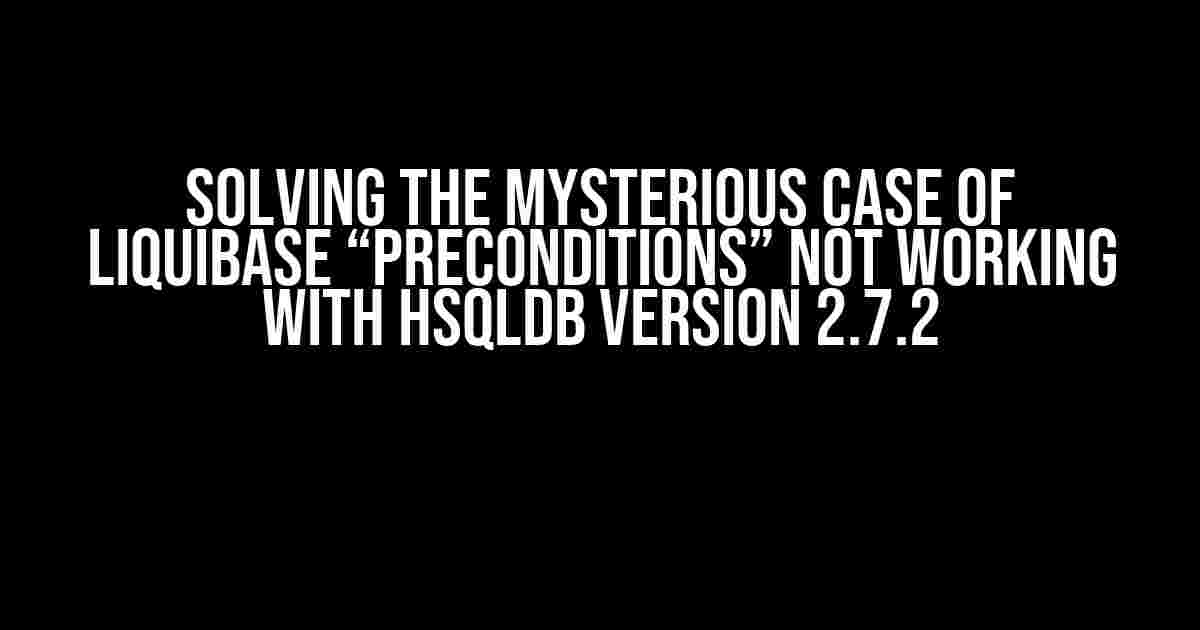If you’re reading this, chances are you’re stuck in the dark alleys of Liquibase errors, desperately trying to troubleshoot why “preConditions” aren’t working as expected with HSQLDB version 2.7.2. Fear not, dear reader, for you’re not alone in this struggle. In this article, we’ll embark on a thrilling adventure to conquer this pesky issue and emerge victorious.
The Problem: “preConditions” Not Working as Expected
Liquibase’s “preConditions” feature is an incredibly powerful tool that allows you to specify conditions that must be met before a changeset is executed. It’s like having a trusty sidekick that makes sure your database is in the correct state before applying changes. However, when using HSQLDB version 2.7.2, you might encounter issues with “preConditions” not working as intended.
Symptoms of this issue may include:
- “preConditions” not being executed at all
- Changesets being applied despite failing “preConditions”
- Error messages that seem to make no sense (we’ve all been there, haven’t we?)
So, What’s the Culprit Behind This Mysterious Behavior?
After digging deep into the depths of Liquibase and HSQLDB, we discovered that the root cause of this issue lies in the way HSQLDB version 2.7.2 handles certain database metadata operations.
It turns out that HSQLDB 2.7.2 has a quirk where it doesn’t correctly support certain JDBC metadata operations, which Liquibase relies on to execute “preConditions”. This means that when you try to use “preConditions” with HSQLDB 2.7.2, Liquibase gets confused and doesn’t execute the conditions as expected.
Solving the Puzzle: Workarounds and Fixes
Fear not, dear reader, for we have not one, not two, but three workarounds to help you overcome this hurdle!
Workaround 1: Upgrade to HSQLDB 2.7.3 or Later
The easiest and most straightforward solution is to upgrade to HSQLDB 2.7.3 or a later version. This version fixes the metadata operations issue, allowing Liquibase’s “preConditions” to work seamlessly.
All you need to do is:
- Download the latest HSQLDB version from the official website
- Update your project’s dependencies to point to the new HSQLDB version
- Run your Liquibase changesets again, and voilà! “preConditions” should work as expected
Workaround 2: Use a Different Database Driver
If upgrading HSQLDB isn’t an option, you can try using a different database driver that doesn’t rely on the problematic metadata operations.
One such driver is the org.h2Driver driver, which is compatible with HSQLDB. You can update your Liquibase configuration to use this driver instead:
<database url="jdbc:h2:mem:test" username="sa" password="" driver="org.h2.Driver" />
This should allow “preConditions” to work correctly, but keep in mind that this might require additional configuration and testing.
Workaround 3: Implement Custom “preConditions” Logic using SQL
If upgrading HSQLDB or changing database drivers isn’t possible, you can create custom “preConditions” logic using SQL scripts. This approach requires more effort, but it’s a viable solution in a pinch.
Here’s an example of how you can implement a custom “preCondition” check using SQL:
| Changeset | “preCondition” Check |
|---|---|
<changeSet
|
<preConditions>
|
In this example, the “preCondition” check uses a SQL query to verify the existence of a specific table in the database. If the table doesn’t exist, the changeset won’t be executed.
Conclusion: The Mystery Solved!
And there you have it, folks! With these three workarounds, you should be able to overcome the issue with Liquibase “preConditions” not working with HSQLDB version 2.7.2. Remember, in the world of database migrations, being prepared for the unexpected is key.
By applying these solutions, you’ll be well on your way to taming the beast that is “preConditions” in Liquibase. Happy migrating!
Final Thoughts and Takeaways
Before we part ways, here are some final thoughts to keep in mind:
- Keep your database drivers and versions up to date to avoid compatibility issues
- Test your “preConditions” thoroughly to ensure they’re working as expected
- Don’t be afraid to experiment and try different approaches when faced with errors
By following these best practices, you’ll be well-equipped to tackle any database migration challenge that comes your way.
Thanks for joining me on this epic adventure, and I hope you found this article informative and helpful. Happy coding!
Frequently Asked Question
Liquibase preConditions not working with hsqldb version 2.7.2? Don’t worry, we’ve got you covered!
What is the main issue with Liquibase preConditions and hsqldb version 2.7.2?
The main issue is that Liquibase’s preConditions are not being executed when using hsqldb version 2.7.2, causing database changes to be applied without validation.
Are there any specific preConditions that are affected by this issue?
Yes, the issue specifically affects preConditions that rely on database metadata, such as `runningAs` or `dataSource` conditions.
Is there a workaround to make preConditions work with hsqldb version 2.7.2?
Yes, you can use a custom implementation of the `Database` class that overrides the `getDatabaseProductName()` method to return the correct product name for hsqldb version 2.7.2.
Will upgrading to a newer version of hsqldb resolve the issue?
Yes, upgrading to a newer version of hsqldb, such as 2.7.3 or later, should resolve the issue with Liquibase preConditions.
Are there any other configuration changes required to make preConditions work with hsqldb?
Yes, you may need to configure the `liquibase.database` property in your `liquibase.properties` file to specify the correct database type and version.
